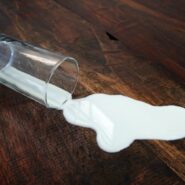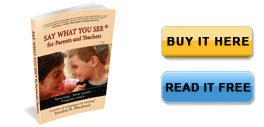Ending the Blame Game

Though I probably had two of the most loving parents on the planet, when I was growing up, if something was out of place, broken, or spilled an accusation like, "Who did this?" would ring through the house. Three of us kids would chime back, "Not me!" The guilty fourth would defend with, "It wasn't my fault! I didn't do it on purpose."
This attempt to instill responsibility ended up instilling guilt instead, which although I tried not to, I passed on to my kids. Following a recent breakthrough, now I know how not to.
The simplest way to stay calm and turn an accident into a teaching moment is to make an objective observation and just SAY WHAT YOU SEE (SWYS):
SWYS: "You reached across the table and knocked over the milk."
CAN DO: "You can get the sponge and help clean it up."
Once the problem is corrected and things are back to normal, you can go back and encourage the child to problem-solve:
CAN DO: "Must be something you can do next time to make sure nothing spills."
If the child says, "I could check first," the next time he or she checks successfully you can add the STRENGTH:
STRENGTH: "You checked before you reached. That shows you are observant (careful, considerate, etc.)."
For a young child, you can encourage the behavior further by creating a special job that acknowledges the child's effort and ability:
CAN DO: "You can be our Spill Checker and let us know what to watch out for at dinner."
If your child is already hooked into the blame game, when you SAY WHAT YOU SEE, you will get a defensive response. Validating the child's concerns and emphasizing his or her intentions will help turn the child around:
SWYS: "You reached across the table and knocked over the milk."
Child: "I didn't mean to!"
SWYS: "You wouldn't want me to think you meant to. Actually, it seems more like you were so focused on reaching what you wanted that you didn't notice the milk. Doesn't sound intentional to me."
CAN DO: "You can get the sponge and help clean it up..."
If it helps, think about what it would've looked like if your child had intended to knock over the milk. Certainly, it would have had a lot more flair! With older children, sharing a comment like that can help end the blame game for good!
A side note: My mentor, Dr. Garry Landreth, shared his childhood milk-spill experience of an understanding mother who offered a sponge instead of harsh words. He went on to change thousands of lives in the same way. Who knew that the way we respond to spilled milk could create those kinds of ripples?!!





